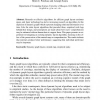Free Online Productivity Tools
i2Speak
i2Symbol
i2OCR
iTex2Img
iWeb2Print
iWeb2Shot
i2Type
iPdf2Split
iPdf2Merge
i2Bopomofo
i2Arabic
i2Style
i2Image
i2PDF
iLatex2Rtf
Sci2ools
110
click to vote
DIAGRAMS
2008
Springer
2008
Springer
Extremes Are Better: Investigating Mental Map Preservation in Dynamic Graphs
Research on effective algorithms for efficient graph layout continues apace, and faster technology has led to increasing research on algorithms for the depiction of dynamic graphs which represent changing relational information over time. Like the static layout algorithms that preceded these, empirical work lags behind their design, and assumptions are made about how users' comprehension may be enhanced without human data to support them. This paper presents an experiment investigating an existing dynamic layout algorithm, focusing on the effect of the preservation of the mental map on comprehension. The results indicate that extremes produce better performance, suggesting that individual preference may be important.
Artificial Intelligence | DIAGRAMS 2008 | Layout Algorithm | Layout Continues Apace | Static Layout Algorithms |
| Added | 19 Oct 2010 |
| Updated | 19 Oct 2010 |
| Type | Conference |
| Year | 2008 |
| Where | DIAGRAMS |
| Authors | Helen C. Purchase, Amanjit Samra |
Comments (0)

